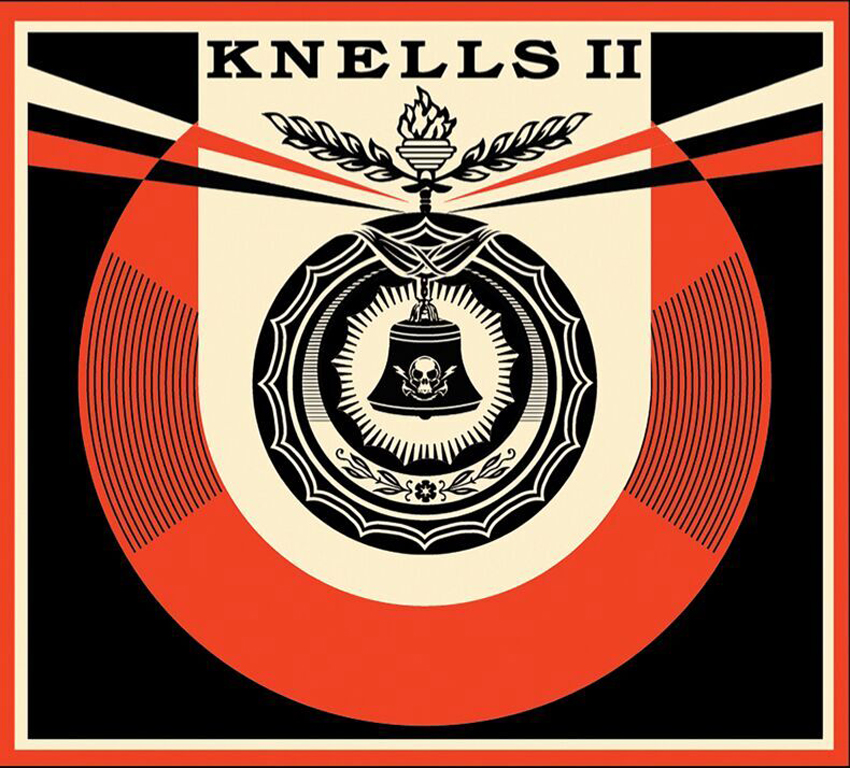

Led by classical guitar wunderkind Andrew McKenna Lee, Knells combine classical idioms with highly experimental, pretty much category-free music. Very challenging and deeply satisfying. Read on as Lee goes through the new Knells release track by track...
Track 1: First Song
AML: Musically, the introduction and first large section of the song takes a structural cue from some of J.S. Bach's instrumental preludes (BWV 999 and 1007 for example) which frequently feature slowly unfolding arpeggiated chord progressions over a pedal or drone-like bass line. From there, it transitions to a comparatively gentle pre-chorus that sets the stage for a large, anthemic chorus, whose lyrical message — "just cut the ball and chain and free yourself" — is both the heart of the song and the album as a whole.
Track 2: Interlude
AML: As a child, I recall my father frequently musing about how some of the stars in the sky had died eons ago, but that their light was still traveling towards us, and was still visible, in spite of the fact that the stars themselves no longer existed. It's a fascinating enough idea in itself, but it also seems to have metaphorical value: we live in the world and make choices that impact not only those we love but also our surroundings and our environment. Although our actions ultimately affect the steady state of the universe to an infinitesimally minuscule extent, the currents, eddies, and afterimages of our lives nonetheless continue to ripple out forever as a consequence of our having ever even existed at all.
Track 3: Could You Would You
AML: Could You Would You is a song about choices, and whether we can find the courage to make difficult decisions when there are no easy options. More specifically, it's about making decisions that will ultimately lead to better things, but that produce uncomfortable short term consequences. If First Song is an anthem to letting go, then Could You Would You is about the often difficult journey of getting to a place where that action becomes possible.
Track 4: Sub Rosa
AML: In spite of its upbeat character, Sub Rosa is a macabre little song about appreciating time, not taking it for granted, and letting go of the past. It's about learning to do all these things in light of the knowledge that although we might be here today, we may not be here tomorrow.
Track 5: Coda
AML: Coda is an instrumental that takes the guitar part of the chorus of Sub Rosa, slows it down, repeats it, and lets it develop into its own little epic.
Track 6: Bargaining
AML: Bargaining is another little instrumental, this time in the guise of a guitar solo. The blues-inspired riffs that comprise the tune have a plaintive, pleading quality to them, and seem to suggest grief, of which "bargaining" is considered an important, intermediate stage. The tune pays homage to a few different personal guitar heroes before segueing directly into the next track.
Track 7: Final Breath
AML: Final Breath, like its mirror song on the first half of the album, Sub Rosa, is another song about death. It was inspired by a couple specific things. The first is a Daniel Lanois song with the lyric, "Where will I be when my trumpet sounds?" The other is the experience people often say they have in moments of extreme fear, which is that they see their life "flash before their eyes." In hindsight, this is obviously the most personal song on the album. In the years since my father's passing, I have often wondered what he was thinking in the moments that he lost control of his car: what thoughts flashed through his mind; what feelings coursed through his psyche? It seems a morbid and pointless thing to reflect upon, as I will never really know, but the exercise nonetheless makes me feel close to him — almost like I'm in the car with him in that moment. And in that imagined closeness, I sense his humanity as distinct from his role as my father, and I feel both his absence from my life for the past 30 years, and an ocean of love, finally released from behind the dam I used to store it all once he died and I had no idea what to do with it anymore.
Track 8: Poltergeist
AML: Poltergeist is a song about letting our lesser selves get the better of us — repeatedly. It's a song about addiction, unhealthy obsessions, or any other type of self-defeating compulsion. Similar to Could You Would You, it's also a song about choices: will you "cast the salt and burn the sage," and take the action necessary to cleanse your soul of this self-destructive behavior, or does its familiarity somehow provide you comfort and certainty, if at the expense of your spiritual well-being?
Track 9: Interlude II
AML: Interlude II, like its sister track, Interlude I, is another meditation on life, its origins, meaning, and ephemeral nature.
Track 10: Immolation
AML: Immolation essentially functions as a refrain of the musical and lyrical ideas presented in First Song. It's another tune about acceptance, and learning to let go through understanding that many of our struggles are exacerbated by further "struggling against the struggle," so to speak. The title, which means "self-sacrifice," is essentially a reflection on this condition, and the idea that we sometimes believe we are bettering ourselves and administering justice for past transgressions through sacrificing our own happiness.